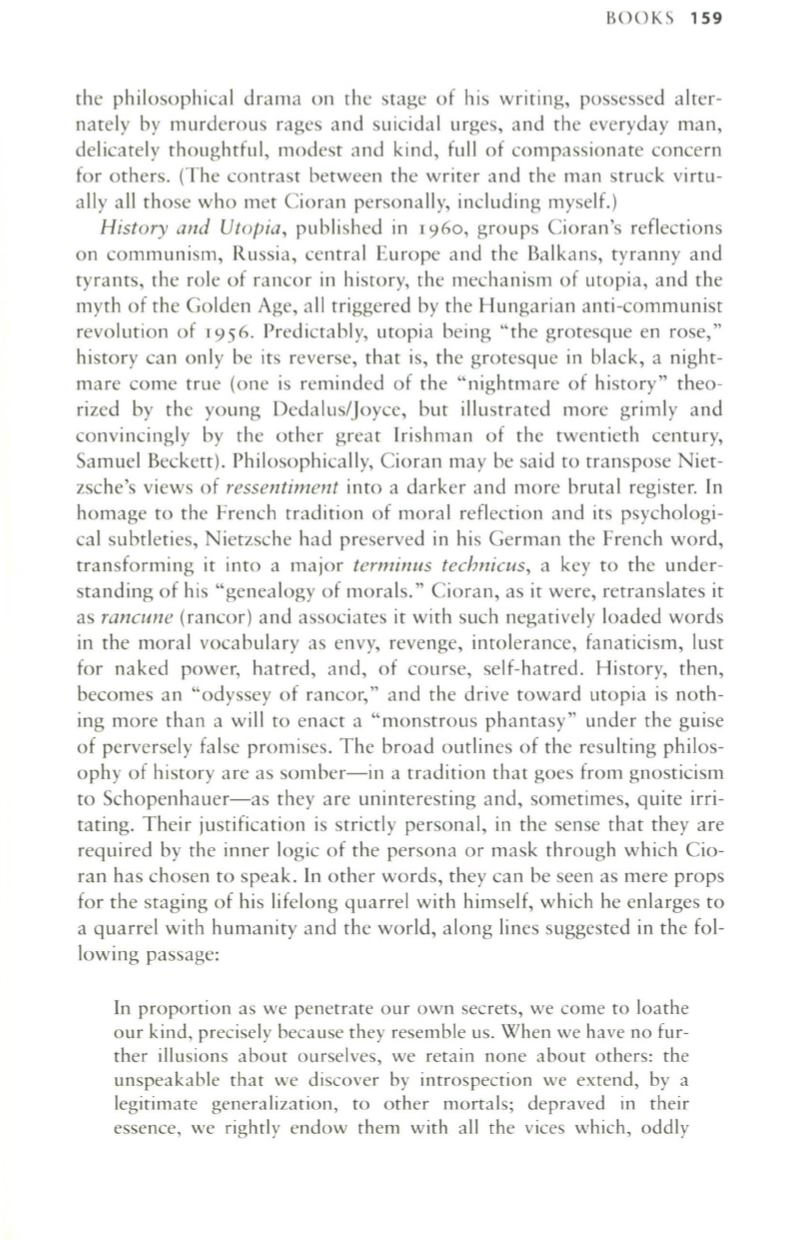
BOOKS
1S9
the philosophical drama on the stage of his wrttlng, possessed alter–
nately by murderous rages and suicidal urges, and the everyday man,
delicately thoughtful, modest and kind, full of compassionate concern
for others. (The contrast between the writer and the man struck virtu–
ally all those who met Cioran personally, including myself.)
History and Utopia,
published in 196o, groups Cioran's reflections
on communism, Russia, central Europe and the Balkans, tyranny and
tyrants, the role of rancor in history, the mechanism of utopia, and the
myth of the Golden Age, all triggered by the Hungarian anti-communist
revolution of 1956. Predictably, utopia being "the grotesque en rose,"
history can only be its reverse, that is, the grotesque in black, a night–
mare come true (one is reminded of the "nightmare of history" theo–
rized by the young Dedalus/Joyce, but illustrated more grimly and
convincingly by the other great Irishman of the twentieth century,
Samuel Beckett). Philosophically, Cioran may be said to transpose Niet–
zsche's views of
ressentiment
into a darker and more brutal register. In
homage to the French tradition of moral reflection and its psychologi–
cal subtleties, Nietzsche had preserved in his German the French word,
transforming it into a major
terminus technicus,
a key to the under–
standing of his "genealogy of morals." Cioran, as it were, retranslates it
as
rancune
(rancor) and associates it with such negatively loaded words
in the moral vocabulary as envy, revenge, intolerance, fanaticism, lust
for naked power, hatred, and, of course, self-hatred. History, then,
becomes an "odyssey of rancor," and the drive toward utopia is noth–
ing more than a will to enact a "monstrous phantasy" under the guise
of perversely false promises. The broad outlines of the resulting philos–
ophy of history are as somber-in a tradition that goes from gnosticism
to Schopenhauer-as they are uninteresting and, sometimes, quite irri–
tating. Their justification is strictly personal, in the sense that they are
required by the inner logic of the persona or mask through which Cio–
ran has chosen to speak. In other words, they can be seen as mere props
for the staging of his lifelong quarrel with himself, which he enlarges to
a quarrel with humanity and the world, along lines suggested in the fol–
lowing passage:
In proportion as we penetrate our own secrets, we come to loathe
our kind, precisely because they resemble us. When we have no fur–
ther illusions about ourselves, we retain none about others: the
unspeakable that we discover by introspection we extend, by a
legitimate generalization, to other mortals; depraved in their
essence, we rightly endow them with all the vices which, oddly


